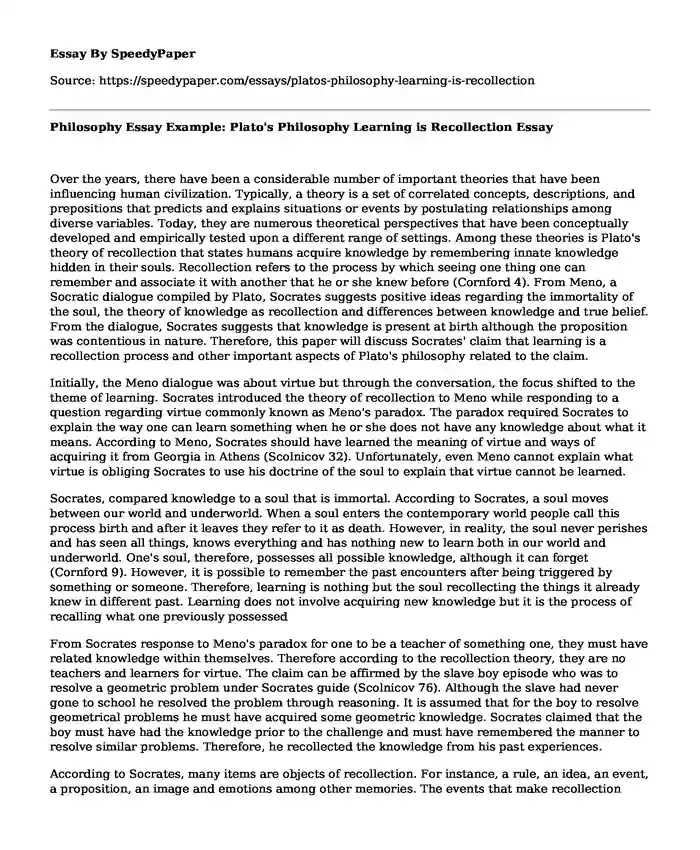
| Type of paper: | Essay |
| Categories: | Philosophers Plato |
| Pages: | 4 |
| Wordcount: | 842 words |
Over the years, there have been a considerable number of important theories that have been influencing human civilization. Typically, a theory is a set of correlated concepts, descriptions, and prepositions that predicts and explains situations or events by postulating relationships among diverse variables. Today, they are numerous theoretical perspectives that have been conceptually developed and empirically tested upon a different range of settings. Among these theories is Plato's theory of recollection that states humans acquire knowledge by remembering innate knowledge hidden in their souls. Recollection refers to the process by which seeing one thing one can remember and associate it with another that he or she knew before (Cornford 4). From Meno, a Socratic dialogue compiled by Plato, Socrates suggests positive ideas regarding the immortality of the soul, the theory of knowledge as recollection and differences between knowledge and true belief. From the dialogue, Socrates suggests that knowledge is present at birth although the proposition was contentious in nature. Therefore, this paper will discuss Socrates' claim that learning is a recollection process and other important aspects of Plato's philosophy related to the claim.
Initially, the Meno dialogue was about virtue but through the conversation, the focus shifted to the theme of learning. Socrates introduced the theory of recollection to Meno while responding to a question regarding virtue commonly known as Meno's paradox. The paradox required Socrates to explain the way one can learn something when he or she does not have any knowledge about what it means. According to Meno, Socrates should have learned the meaning of virtue and ways of acquiring it from Georgia in Athens (Scolnicov 32). Unfortunately, even Meno cannot explain what virtue is obliging Socrates to use his doctrine of the soul to explain that virtue cannot be learned.
Socrates, compared knowledge to a soul that is immortal. According to Socrates, a soul moves between our world and underworld. When a soul enters the contemporary world people call this process birth and after it leaves they refer to it as death. However, in reality, the soul never perishes and has seen all things, knows everything and has nothing new to learn both in our world and underworld. One's soul, therefore, possesses all possible knowledge, although it can forget (Cornford 9). However, it is possible to remember the past encounters after being triggered by something or someone. Therefore, learning is nothing but the soul recollecting the things it already knew in different past. Learning does not involve acquiring new knowledge but it is the process of recalling what one previously possessed
From Socrates response to Meno's paradox for one to be a teacher of something one, they must have related knowledge within themselves. Therefore according to the recollection theory, they are no teachers and learners for virtue. The claim can be affirmed by the slave boy episode who was to resolve a geometric problem under Socrates guide (Scolnicov 76). Although the slave had never gone to school he resolved the problem through reasoning. It is assumed that for the boy to resolve geometrical problems he must have acquired some geometric knowledge. Socrates claimed that the boy must have had the knowledge prior to the challenge and must have remembered the manner to resolve similar problems. Therefore, he recollected the knowledge from his past experiences.
According to Socrates, many items are objects of recollection. For instance, a rule, an idea, an event, a proposition, an image and emotions among other memories. The events that make recollection doctrine transcendental. The theory of recollection explains the manner in which people come to know and relate to different things in life. In most cases, the inmate knowledge is drawn out through dialogue and reflection. However, the theory can be criticized because it does not expound the manner in which knowledge comes to be in human souls. Likewise, an external soul might exist without the knowledge and at some point in its progression learn from the underworld. Contrary to Socrates doctrine, learning would be taking place. In fact, they are those who believe that learning has been an ongoing process that has been going on for a long time. Socrates theory, therefore, has some shortfalls and should not be considered entirely valid. In fact, the theory is prone to changes with time, research and level of development in the contemporary society.
In conclusion, the theory of recollection emphasizes that learning is an act of recollecting things and activities we knew even before we were born but then forgot with time. From Socrates explanation, one can seek something even without knowing in advance what you are seeking. In such cases, people should strive to acquire knowledge of virtue. Therefore, learning as a recollection is a type of intuition caused by seeing or reading about activities that one might have engaged in their past experience. Likewise, recollecting can be guided by someone through the dialectic process. Lastly not all learning results in a recollection of pre-embodiment encounters with past activities.
Works cited
Cornford, Francis Macdonald. Plato's theory of knowledge. Routledge, 2013.
Scolnicov, Samuel. Plato's Metaphysics of Education (RLE: Plato). Routledge, 2013.
Cite this page
Philosophy Essay Example: Plato's Philosophy Learning is Recollection. (2022, Aug 31). Retrieved from https://speedypaper.com/essays/platos-philosophy-learning-is-recollection
Request Removal
If you are the original author of this essay and no longer wish to have it published on the SpeedyPaper website, please click below to request its removal:
- Essay Example on Evaluating a Doctoral Study
- Quality of Service Essay Sample
- Essay Example: The Illusive Eye Exhibition at The Museo Del Barrio NYC
- Application of Virtual Reality, Essay Example for Students
- Wellness Program in the Healthcare Setting to Motivate Nurses
- Free Essay: Description of Vroom's Model of Expectancy Theory
- Essay Example: Internal Analysis for Cathay Pacific Airways Essay
Popular categories




